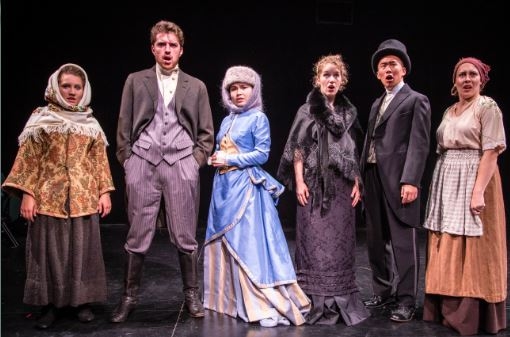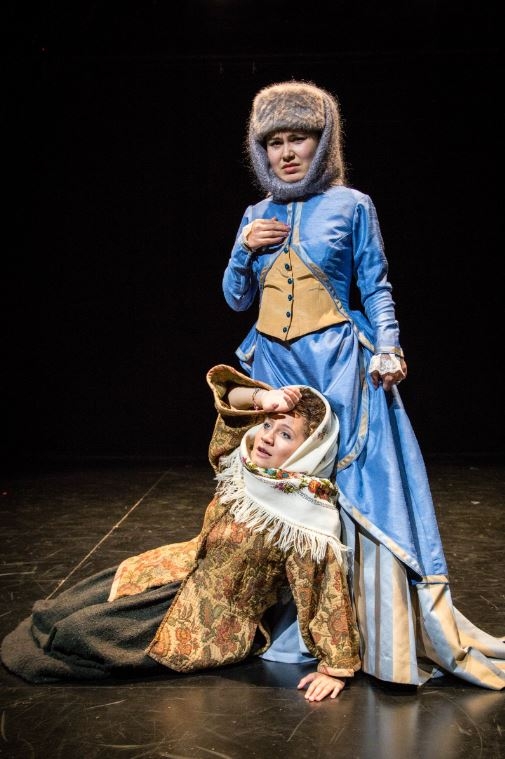When Anton Chekhov's play "The Anniversary" opens, we are confronted with Kusma Khirin, a bitter bookkeeper at a corrupt bank, kvetching about the infinite injustices of life.
He is complaining about his long hours, his coughs, his aches and his inflammations. Then there's his "scoundrel" of a boss, who will soon be publicly reciting a report filled with fraudulent numbers.
Soon thereafter, we meet that boss, Andrey Shipuchin, who takes a break from accepting an award for the bank's 50th anniversary to complain about the dreaded return of his young and talkative wife.
I'm glad she's coming, Shipuchin tells Khirin, but would be gladder if she only stayed another couple of days with her mother. He shivers and complains about his dancing nerves: "They are so strained that I think the very smallest trifle would be enough to make me break into tears!"
These are the types of problems -- big and small, unusual and all-too-familiar -- that fill Chekhov's farces, dizzying one-act plays that may have more in common with episodes of "Curb Your Enthusiasm" and "Veep" than with his longer, loftier works -- the likes of "The Seagull" and "The Cherry Orchard."
Here, the world is populated with petty people doing selfish things while insulting one another, and complaining about everything under the Moscow sky. This, as JAY-Z might say, is a world of 99 problems. Or, as Russian dramatist Vsevolod Meyerhold put it: a world of 33 swoons.
For Meyerhold, a correspondent and disciple of Chekhov, the farces were serious business. In 1935, five years before he was arrested, tortured and executed under Josef Stalin's Great Purge, Meyerhold put on an experimental adaptation of three Chekhov farces -- "The Bear," "The Proposal" and "The Anniversary" -- as part of a performance called "33 Swoons," a title that refers to the number of times people swoon in the three plays.
The Meyerhold work was a critical flop during the era of realism, when glorifying communism was all the rage (his theater was shut down in 1937). Alex Johnson, associate artistic director of Stanford Repertory Theater (SRT), hopes for a better result this month, when the theater company begins its run of "The Many Faces of Farce," featuring a production of the three Chekhov farces, followed by a piece based on "33 Swoons."
Johnson is no stranger to Chekhov, having both directed and acted in some of his classics (he recently directed "Uncle Vanya"). Now, he is looking forward to reviving the farces, which were commercial hits for Chekhov in 1890s Russia but have "faded out of view" in today's theater scene even as Chekhov's longer pieces continue to be widely performed and studied.
One of the missions that SRT embraces, he said, is "finding works and presenting works that otherwise would not get an audience," whether for commercial reasons, reasons of fashion or logistical problems (it just doesn't make sense, he said, for most companies to do a lot of 20-minute plays).
In staging the farces, one of the challenges that any theater company must overcome is mastering the comic timing. Playwright John Mortimer once defined farce as "tragedy played at about 120 revolutions a minute," and that description seems apt when we watch portly, irritable Ivan Lomov in "The Proposal" whine about his many pains ("I suffer from palpitations... At this very moment my lips are trembling, and there's a twitch in my right eyebrow").
But while these farces are more concerned with the multitude of common maladies than with weightier questions about the Russian soul or the meaning of love, Johnson sees a common thread: what he calls Chekhov's "360-degree vision of people."
"The farces are silly and fast-paced, but they still are depicting recognizably human people," Johnson said. "They are not cartoon people, which is one of the things that's wonderful to rehearse."
They also like to bicker, nag, lie and make a quick ruble. "The Bear" revolves around a crude landowner named Grigory Smirnov, who's come to collect his debt from Elena Popova, a grieving widow with an excellent set of Smith and Wesson revolvers.
Nothing here is sacred; much is profane. Smirnov, ever the misogynist, mocks Popova's grief and proclaims that there are no faithful women, though he then pivots to support gender equality just so that he can challenge Popova to a duel.
In "The Anniversary," Khirin and Shupuchin are desperately trying to fend off both Shipuchin's frivolous wife and an old woman named Nastasya Merchutkina, a wife of a civil servant who is demanding restitution of her husband's salary and who won't take no for an answer no matter how many times she is told she is in the wrong place.
A scuffle between a sexist man and a stubborn woman is also at the heart of "The Proposal," which pits Lomov (the evening's undisputed swooning champion) against Natalya Stepanovna, a neighbor's daughter whom he hopes to marry. Alas, the "proposal" gets hijacked by angry arguments over who owns a particular patch of land and a better hunting dog.
For Meyerhold, the petty pains and trivial conflicts featured in these farces point to a more profound malady: the insipid nature of Russia's intellectual elites in the late 19th century. The swoon, he wrote, was a "manifestation of neurasthenia" -- a symptom of lethargy and weak will. It was his insistence on focusing on these human shortcomings, rather than Soviet glories, that led to his demise.
By juxtaposing the two productions, SRT wants to both explore the nature of comedy and build for the audience a connection, through Meyerhold, between Chekhov's time and now, Johnson said. The production aims to explore the way in which farce and political circumstances intersect, "the way in which humor can be dangerous" and the way in which the creative elements that Meyerhold employed in the 1930s continue to help dramatists tell stories today.
For Johnson, Meyerhold represents the two-sided coin most artists have to deal with -- the choice between what is commercially viable (and politically acceptable) and what is artistically satisfying. He hated Soviet realism and refused to follow the form, opting instead to create new forms.
The flip side of the coin, Johnson said, is a vision of the theater as an "almost utopian place," Johnson said.
"The vision where we can create a paradise in a theater or in a classroom and we can model in that small space the future of a better world, that's something Chekhov cared deeply about and it's something that we at Stanford Repertory Theater care deeply about," Johnson said.
The timing for this farcical resurgence -- and the serious conversations it was designed to provoke -- may be particularly auspicious. We live, after all, in an era where anti-heroes are the TV stars, where Alec Baldwin and Melissa McCarthy win Emmys for skewering the president and his chief spokesman, and where the president himself welcomes chaos and regularly takes to Twitter to complain about all things big and small.
These parallels aside, Johnson wants the audience members who attend the shows to consider broader and weightier questions about the role of comedy and the choices artists have to make to stay true to themselves and to those around them.
"One of the things any artist is grappling with now is: What is the social responsibility of being an artist? This is something Meyerhold took very seriously and so did Chekhov, and it produced very different results for them," Johnson said. "We've been asking: What is our obligation to artists in 2017, in a world increasingly aware of problems and increasingly aware of the limited ways in which these problems can be addressed?"
What: Stanford Repertory Theater's "The Many Faces of Farce"
Where: Nitery Theater, 514 Lasuen Mall, Stanford
When: Aug. 10-27 (see website for schedule of shows)
Cost: $10-$20
Info: Go to SRT





Comments
another community
on Aug 3, 2017 at 11:12 pm
on Aug 3, 2017 at 11:12 pm
Nice to see something about the influence of Chekhov on Meyerhold. Sometimes the connection is not always apparent although Chekhov had a strong avant-garde streak as well. This is testified by Vakhtangov's treatment of Chekhov who took a more unorthodox approach. There are two films which explore some of these themes: "Meyerhold Theatre and the Russian Avant-garde" and "Vakhtangov and the Russian Theatre" For more info see http://www.copernicusfilms.com or http://www.meyerholdfilm.blogspot.com
Midtown
on Aug 16, 2017 at 10:54 pm
on Aug 16, 2017 at 10:54 pm
Nice review! I saw the play and recommend it too. I wish I had read the above review to better understand the second act of the play.